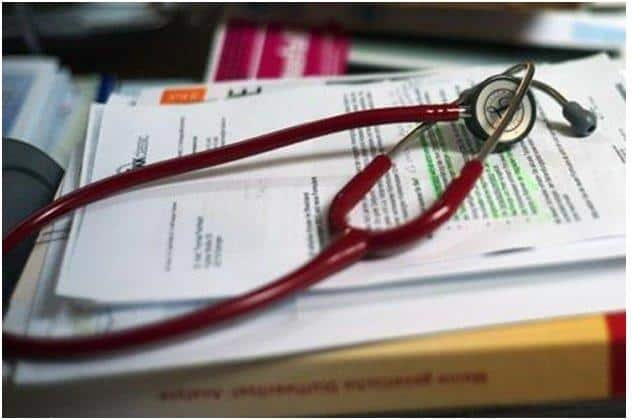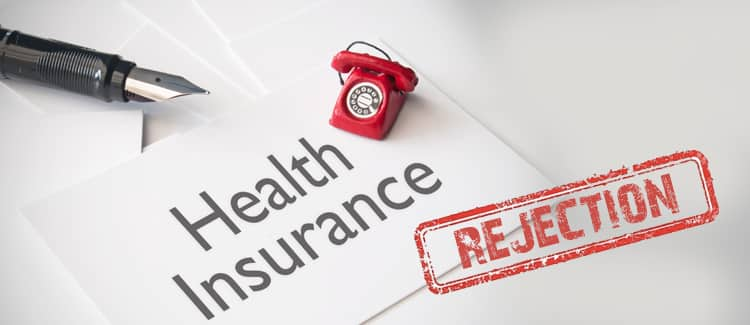The resistance is higher in narrow arteries. The broader the arteries, the lesser will be the blood pressure and vice versa. In the long term, increased blood pressure can result in various health issues including heart ailments.
Hypertension or high blood pressure usually develops over a course of time. Most of the symptoms go unnoticed, but they can cause serious damage to blood vessels, organs, especially the brain, eyes, kidneys, and heart.
It is important to detect it early and get your blood pressure checked regularly. If any abnormality is found in your blood pressure levels, then your doctor will check it regularly over a few weeks to assure if it stays normal or gets elevated.
Hypertension can be treated by following a healthy lifestyle and taking prescription medications on a regular. If left treated, it can lead to serious health issues, including stroke and heart attack.
Symptoms of High Blood Pressure/ Hypertension
Hypertension is a silent condition that can go without any symptoms for years. Even without symptoms, the damage to the heart and the blood vessels continues. In 95% of the cases, people do not get any symptoms even when the blood pressure reaches to the dangerously high level. To find out if you have hypertension it is important to get your blood pressure regularly checked.
Some of the common signs and symptoms of high blood pressure include nosebleed, headaches, and shortness of breath, nausea, and dizziness. However, these symptoms are not very specific and only show sings when then blood pressure rises to an extremely high level.
Causes of High Blood Pressure/ Hypertension
Stress is of the major causes of hypertension or high blood pressure. Even without stress blood pressure can be raised on its own due to underlying kidney disease or any other health condition. Hypertension can also lead to stroke, heart attack and other health problems. Lifestyle factors are the best way to address high blood pressure can be easily addressed with hypertension. There are two types of hypertension:
Primary Hypertension
Essential hypertension is also termed primary hypertension. It can develop over a period of time with no recognizable causes. And most of the people suffer from this type of high blood pressure. Though it is unclear as to what mechanisms actually lead to an increment of blood pressure to slowly increase. A combination of factors may play a role. These factors include:
- Physical Changes: Any change in your body can be a sign of an underlying health condition. If anything in your body changes, then it may affect your entire body. And sometimes high blood pressure can be one of the major reasons. For instance, your kidney functioning can change with age and it may hamper your body’s natural balancing of fluid and salts. And this may cause changes in your overall blood pressure.
- Genes: It can also be one of the major reasons behind hypertension. It can be due to genetic abnormalities or gene mutations.
- Environment: Imbalanced diet and lack of physical activity can also lead to blood pressure problem. It can take a serious toll on your health. Moreover, it may lead to weight issues, obesity and overweight, which further increases your chances of hypertension.
Secondary Hypertension
Secondary hypertension is quite common and can become more severe than primary hypertension. There are conditions that may cause secondary hypertension include:
- Congenital heart defects
- Kidney disease
- Certain endocrine tumors
- Thyroid problems
- Adrenal gland problems
- Alcohol overdose or chronic use
- Obstructive sleep apnea
- Use of illegal drugs
- Side effects of medications
Resistant Hypertension
Resistant hypertension is a medical condition where you cannot control your high blood pressure even with medications. If the hypertension is not controlled with several medications then it is called resistant hypertension. It is quite difficult to control blood pressure, but it may increase the risk of stroke and heart attack. There is ongoing medical research to effectively treat resistant hypertension.
Risk factors of Hypertension/High Blood Pressure
Hypertension has several risk factors, including:
- Age: With age, our blood vessels start losing their elasticity that leads to an increase in blood pressure. As one crosses the age limit of 60 the chances of high blood pressure increase. However, due to the sedentary lifestyle, nowadays, even young people are prone to high blood pressure.
- Gender: Women are prone to hypertension after the age of 55 years and men are more vulnerable to high blood pressure before the age of 55 years.
- Smoking: Smoking is one of the major reasons that lead to hypertension among most of the people. It also results in narrowing down of the blood vessels, atherosclerosis, and reduces the flexibility of the arteries.
- Diet: Consuming too much salt in the food can lead to an increase in blood pressure. Consuming less salt may prove to be beneficial for some, but for others, it may not work. It varies from person to person.
- Stress: Stress and anxiety significantly add to the blood pressure. The body releases norepinephrine, epinephrine, and cortisol hormones, which narrow down the blood vessels, succumbing to stress. Frequent alterations and narrowing down of blood vessel diameter can result in hypertension after a period of time.
- Sedentary Lifestyle: Inactive lifestyle, lack of regular exercise can result in hypertension as hormonal changes can lead to weight gain and physical exercises help in maintaining optimal blood pressure.
- Alcohol: Overdose of alcohol is also one of the primary reasons behind hypertension. However, the impact of smoking is much more than alcohol.
- Drug Consumption: Consumption of recreational drugs, such as heroin, cocaine, and methamphetamine can lead to dramatic shifts in blood pressure. A number of chronic hypertension cases have been reported due to this.
Complications of Hypertension/ High Blood Pressure
High blood pressure not only creates pressure on the walls of the arteries, but it also has a damaging effect on the other body organs. The pressure increases the damages and also the risks associated with it. Here is a quick rundown of some of the major complications that lead to hypertension:
- Heart Attack or Stroke: High blood pressure can lead to thickening of arteries, which is called It can lead to heart complications such as a stroke, or a heart attack.
- Heart Failure: In a condition like high blood pressure, your heart needs to work harder to pump blood. Simply put it results in thickening of left ventricular hypertrophy or the heart’s pumping chamber. Due to the thickening of muscles, the heart is unable to pump enough blood to meet the body’s requirements, which may lead to heart failure.
- Metabolic syndrome: In this condition, a lot of metabolic risk conditions come together and can lead to diabetes and heart disease.
- Aneurysm: This condition involves the weakening of blood vessels, which get swollen. In most of the cases, it does not show any noticeable symptoms, but if it ruptures, it can cause internal bleeding or even become life-threatening.
- Loss of Vision: Vision loss is also one of the major issues that people with high blood pressure are prone to.
- Kidney Problems: For proper functioning of the kidneys, it is important to maintain normal blood pressure. High blood pressure can lead to the weakening of the blood vessels all over the body and improper blood flow can cause kidney problems.
- Forgetfulness and Information Processing: It can also slow down a person’s ability to think and remember.
- Dementia: As the blood flow to the brain gets restricted it can also result in vascular dementia.
Myths of Hypertension/ High Blood Pressure
If There Are No Symptoms Then There Is No Hypertension
It is called a silent disease as in most of the cases people do not face any symptoms. It is an asymptomatic disease.
Hypertension is Common
Most people think that it is not a big deal to have High blood pressure. Hypertension is quite dangerous and can cause significant damage to other organs and heart if it is not controlled.
Hypertension is Unpreventable
With lifestyle alterations, you can prevent blood pressure and related conditions. It is important to eat right, stay fit, exercise, and reduce alcohol or tobacco to prevent yourself from this deadly health condition.
Drinking Wine Is Good for Heart
There is no specific medical research that proves that wine is a solution to heart problems. It does help in relaxing your mind, and for that point of time might help to lower down your blood pressure. Wine is good for health if it is taken in moderation. It doesn’t help in dealing with chronic hypertension.
Merely Reducing Table Salt Intake Will Help
Reducing table salt certainly helps. But maximum salt intake comes from processed foods. Food items like cheese, butter, cookies, chips, and all the packaged products are loaded with sodium/salt that one needs to check before the consumption.
Anger and Agitation Is a Symptom of High Blood Pressure
It is certainly not true as stress or anger is not a symptom but a cause of high blood pressure. If you have an aggressive nature, your blood pressure is likely to increase.
You can Discontinue Medications Once Your Blood Pressure Gets Normalized
Hypertension is sadly a life-long disease and you will have to take medications along with eating healthy and keeping fit. Medications can only control your hypertension and not cure it.
Home Testing Self Checks for Blood Pressure at Home
Home Blood Pressure Monitoring (HBPM)
You can conveniently measure your blood pressure at home. Traditional blood pressure cuffs are becoming more accessible now and are easily used at home to keep a tap on the blood pressure. You can keep a track and record your blood pressure readings.
It is a viable option to diagnose hypertension and once identified it helps in managing it over a course of time.
The readings taken will help you in dealing with fluctuating hypertension and also check if the blood pressure reading is normal or not. Home monitoring can help in assessing your blood pressure during the day and your doctor can help you decide the treatment.
Ambulatory Blood Pressure Monitoring (APBM)
Ambulatory Blood Pressure Monitoring machine has a blood pressure cuff that is to be worn on the arm. It is attached to a recording device, which is worn on a belt.
Hypertension is usually assessed by observing the average blood pressure during an entire day. It helps in monitoring the blood pressure fluctuations during a day and it helps your doctor in assessing your recorded average.
The readings given by ABPM are well-validated and are accurately help in diagnosing stage 1 hypertension.
Imaging and Other Tests
Blood pressure can also affect the functioning of your kidneys and heart, and with imaging tests, your doctor can diagnose the related causes and complications.
Electrocardiogram (ECG)
ECG is a simple and basic test that measures your heart rhythm and any abnormalities that may lead to high blood pressure. In fact, high blood pressure can also lead to bodily changes that may result in heart rhythm abnormalities.
Echocardiogram
It is an imaging test that is performed to assess the functioning of your heart; the test creates a visualization of your heart as it moves. Extremely high blood pressure creates recognizable changes that can be identified with this test and any abnormalities in heart functioning.
Ultrasound
Ultrasound is performed to evaluate the kidneys and blood vessels. Health conditions causing narrowing of your blood vessels can be evaluated with an ultrasound.
CAT Scan or MRI
If your doctor suspects a tumor as the cause of your high blood pressure, you may need to have an imaging test, such as CAT scan or MRI, usually to evaluate the kidneys or adrenal glands.
Differential Diagnoses
When your blood pressure is constantly elevated then it is a hypertensive emergency. However, high blood pressure can be a sign of any other underlying health condition other than hypertension; your doctor will need to consider:
- Medication or drug side effect: Hypertension can be caused due to drugs and medication. Once the medications are discontinued then the blood pressure may return to normal. However, it can be difficult to find out if the cause of high blood pressure is medications. For your doctor to determine this you would need to tell your doctor about all the medications or even recreational drugs that you are consuming.
- Hyperthyroidism: High blood pressure can also be caused due to hypertension, increased appetite, weight loss, jitteriness, and sweats. The thyroid can be diagnosed with blood tests to determine thyroid hormone levels.
- Kidney failure: Blood pressure can also be raised with acute or chronic kidney failure. If the reason for hypertension is kidney failure then blood pressure will return to normal once the electrolyte and fluid levels are restored to normal. However, dialysis, medications or transplant, are some of the treatments for Kidney failure. But in most cases, it is a fatal condition.
- Pheochromocytoma: It is a medical condition that is caused by a tumor of the adrenal gland that causes excessive production of norepinephrine and epinephrine. The condition may result in sweating, anxiety, high blood pressure, and a racing heart. Clinical observation of the symptoms is required, along with blood tests, and imaging of the adrenal glands to make the diagnosis.
Hypertension/ High Blood Pressure FAQs
Q1. Does obesity make you more prone to high blood pressure?
Ans. The blood pressure increases with the increase in body weight. Increase in weight also leads to an increase in blood pressure and being overweight also increases the risk of developing hypertension/high blood pressure.
Obesity is caused due to fatty tissues, which increases vascular resistance. This forces the heart to pump extra blood throughout the body, in turn, the arteries get thickened and the blood pressure also increases.
Q2: Is high blood pressure a serious health condition?
Ans. High blood pressure is caused due to a sedentary lifestyle and this is the reason why people tend to ignore it. However, if not controlled timely it can lead to stroke and various other life-threatening diseases that may damage or weaken your blood vessels.
Q3. What age group is affected by hypertension?
Ans. The chances of high blood pressure increase with the age of the person. However, even children can get affected by high blood pressure.
Q4. What does high blood pressure feel like?
Ans. Generally, high blood pressure does not give any symptoms in the beginning in almost 90% of the cases. That is what it is called a silent disease. But if the blood pressure increases too much, then some of the common symptoms that it shows are chest pain, headache, nausea, blurring of vision, difficulty in breathing, etc.
Q5. How to lower my blood pressure immediately?
Ans. As mentioned several times, hypertension is a lifestyle disorder, which can be rectified by improving your lifestyle habits. By following a healthy lifestyle, you can also delay and medication after a certain point in time.
Some of the most helpful ways to reduce your blood pressure include losing extra weight, weight management, regular exercising, healthy diet and by reducing the intake of salt and processed foods in your diet.
Another best way of reducing your BP is by cutting down on tobacco and limiting the intake of alcohol and caffeine as well. By practicing yoga and meditation you can always avoid stress. Drink plenty of water and increase the intake of magnesium and potassium-rich food.
Q6. Can drinking water help you lower blood pressure?
Ans. Increasing the intake of water helps in keeping your body hydrated and helps you in naturally lowering your blood pressure. You should have at least 6-8 glasses of water and you can also add coconut water and lemonade to your diet to; keep yourself hydrated.
Q7. When is the alarming range of blood pressure?
Ans. The normal systolic blood pressure ranges from 90 to 120 and diastolic pressure from 60 to 80. And if your blood pressure ranges between 140 and 90 it falls under the pre-hypertensive range, and you can get it back to normal by making alterations in your lifestyle and eating habits.
Q8. Is it possible to cure hypertension?
Ans. Hypertension is basically a lifestyle disorder and it can be managed instead of being cured (unless it has been caused due to any other disease. In that case, eliminating the disease help in bringing your blood pressure to normal).













































